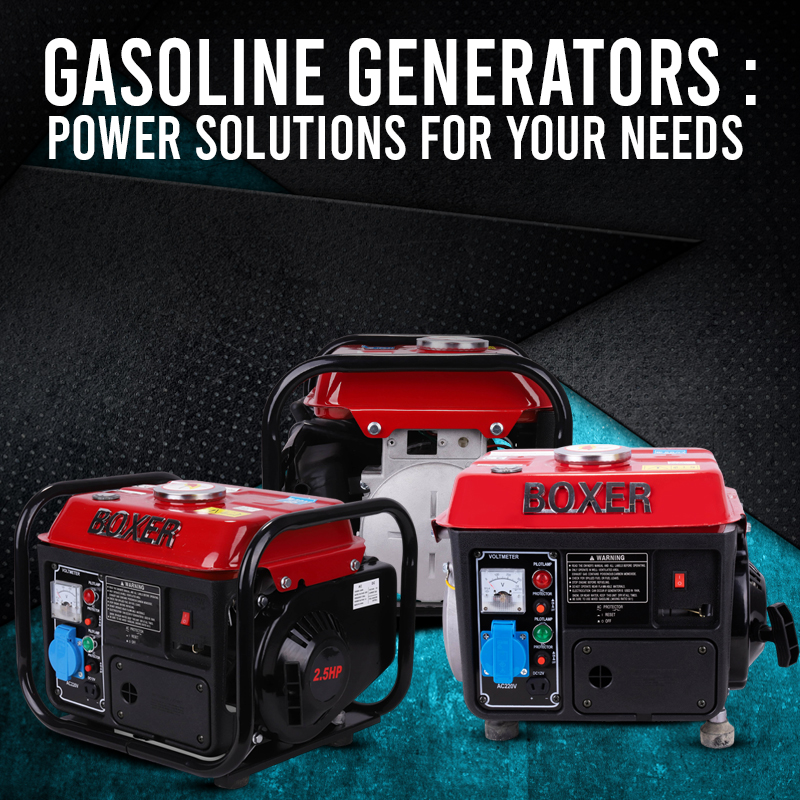
Gasoline Generators: Power Solutions for Your Needs
In today’s world, where power outages can disrupt daily life and businesses, finding reliable power solutions is more crucial than ever. One of the most popular options for backup power is gasoline generators. These machines are versatile, portable, and provide immediate power solutions for various needs, whether at home, in recreational settings, or for professional use. In this comprehensive guide, we will explore the features, benefits, applications, and maintenance of gasoline generators, helping you understand how they can meet your power needs effectively.
Understanding Gasoline Generators
Gasoline generators are portable machines that convert gasoline into electrical energy. They typically consist of an internal combustion engine, a fuel tank, an alternator, and a control panel. When the engine runs, it drives the alternator, which produces electricity. These generators come in various sizes and power outputs, making them suitable for different applications.
How Gasoline Generators Work
The operation of gasoline generators is relatively straightforward. Here’s a step-by-step breakdown:
- Fuel Supply: Gasoline is stored in a fuel tank connected to the engine.
- Ignition: When you start the generator, a spark plug ignites the gasoline-air mixture in the engine’s combustion chamber.
- Power Generation: The engine's pistons move, generating mechanical energy that drives the alternator.
- Electricity Production: The alternator converts this mechanical energy into electrical energy, which is then made available through the generator’s outlets.
Types of Gasoline Generators
Portable Generators: These are compact and lightweight, making them ideal for outdoor activities like camping, tailgating, or construction sites. They typically range from 1,000 to 7,500 watts.
Inverter Generators: Known for their quiet operation and clean power output, inverter generators are perfect for sensitive electronics like laptops and smartphones. They range from 1,000 to 3,000 watts.
Standby Generators: These are larger units designed for home or business use. They automatically kick in during a power outage and can handle heavy loads, often ranging from 5,000 to 20,000 watts.
Advantages of Gasoline Generators
Gasoline generators offer numerous benefits, making them a preferred choice for many users:
Portability: Most gasoline generators are lightweight and easy to transport, allowing you to take them wherever power is needed.
Affordability: Compared to diesel or propane generators, gasoline generators are generally less expensive to purchase and maintain.
Easy Fuel Availability: Gasoline is widely available at gas stations, making it convenient to refuel your generator.
Quick Setup: Gasoline generators can be set up quickly, providing immediate power solutions without the need for extensive installation.
Versatile Applications: From powering household appliances during an outage to providing electricity on construction sites, gasoline generators can be used in various scenarios.
Applications of Gasoline Generators
Gasoline generators serve a wide range of applications, catering to different needs. Here are some common uses:
Home Backup Power
One of the primary reasons people invest in gasoline generators is to provide backup power during outages. These generators can keep essential appliances running, such as refrigerators, lights, and medical equipment, ensuring safety and comfort.
Recreational Use
For outdoor enthusiasts, gasoline generators are invaluable. Whether camping in the woods or tailgating before a big game, a portable gasoline generator can power lights, cookers, and even small refrigerators, enhancing the overall experience.
Construction Sites
Gasoline generators are widely used on construction sites to power tools and equipment. Their portability and ability to deliver high power output make them an essential part of any construction crew’s toolkit.
Events and Festivals
Outdoor events, fairs, and festivals often require temporary power solutions. Gasoline generators can provide electricity for lighting, sound systems, and food vendors, ensuring that everything runs smoothly.
Emergency Services
In emergency situations, gasoline generators can be vital for first responders. They can power essential equipment, communications, and even temporary shelters during disasters.
Choosing the Right Gasoline Generator
Selecting the right gasoline generator for your needs involves considering several factors:
1. Power Requirements
Calculate the total wattage of the devices you plan to power. Ensure the generator can handle both the starting wattage (higher wattage needed to start some appliances) and running wattage (the power needed to keep them running).
2. Portability
If you need a generator for recreational activities or job sites, consider its weight and design. Look for features like wheels and handles for easy transport.
3. Noise Level
Gasoline generators can be noisy, especially under heavy loads. If noise is a concern, consider investing in an inverter generator, which operates more quietly.
4. Fuel Efficiency
Check the generator’s fuel consumption rate to understand how long it can run on a tank of gasoline. More fuel-efficient models will save you money in the long run.
5. Runtime
Look for generators that offer longer runtimes, especially for emergency backup purposes. A generator that can run for 8-12 hours on a full tank will be more practical during outages.
6. Safety Features
Consider safety features such as automatic shut-off, overload protection, and low-oil shutdown to protect both the generator and connected devices.
Maintenance Tips for Gasoline Generators
Proper maintenance is crucial for ensuring your gasoline generator operates efficiently and lasts a long time. Here are some essential maintenance tips:
1. Regular Oil Changes
Change the engine oil as recommended in the manufacturer’s guidelines, usually after every 50-100 hours of use. This helps maintain engine performance and longevity.
2. Clean or Replace the Air Filter
A clean air filter is essential for optimal engine performance. Inspect it regularly and clean or replace it as necessary to ensure proper airflow.
3. Check the Spark Plug
Inspect the spark plug for wear and replace it if necessary. A clean spark plug ensures better fuel combustion and engine performance.
4. Store Properly
If you’re not using the generator for an extended period, store it in a cool, dry place. Empty the fuel tank or add a fuel stabilizer to prevent fuel degradation.
5. Regular Inspections
Periodically check the generator for any signs of wear, such as leaks, frayed wires, or rust. Address any issues promptly to avoid more significant problems down the line.
Safety Precautions When Using Gasoline Generators
While gasoline generators are valuable power solutions, safety should always be a priority. Here are essential safety precautions to consider:
1. Proper Ventilation
Never operate a gasoline generator indoors or in enclosed spaces. The exhaust contains carbon monoxide, which is deadly in confined areas. Always use the generator outdoors in a well-ventilated area.
2. Avoid Overloading
Do not exceed the generator's power output. Overloading can cause damage to the generator and connected devices and pose a fire risk.
3. Use Heavy-Duty Extension Cords
When connecting devices, use heavy-duty extension cords rated for outdoor use. This prevents overheating and reduces the risk of electrical fires.
4. Keep Fuel Safe
Store gasoline in approved containers and away from heat sources. Always refuel the generator when it’s cool to avoid fires.
5. Install Carbon Monoxide Detectors
For added safety, install carbon monoxide detectors in your home to alert you of dangerous gas levels.
Gasoline generators are reliable power solutions that cater to various needs, from emergency backup power to recreational use. Their portability, affordability, and ease of use make them an attractive option for many individuals and businesses. By understanding the different types, applications, and maintenance tips, you can select the right gasoline generator to meet your specific requirements. Always prioritize safety when operating these machines to ensure a safe and enjoyable experience. Whether you need power for home, work, or play, gasoline generators stand ready to deliver the electricity you need, whenever and wherever you need it.
For those looking to invest in high-quality gasoline generators, Boxer Tool offers a wide range of reliable and durable models to suit every need. With a commitment to excellence and customer satisfaction, Boxer Tool ensures that you have the best power solutions to keep you powered up, no matter the situation.
Copyright © 2026 Boxertools | Powered By Orance Media Group








